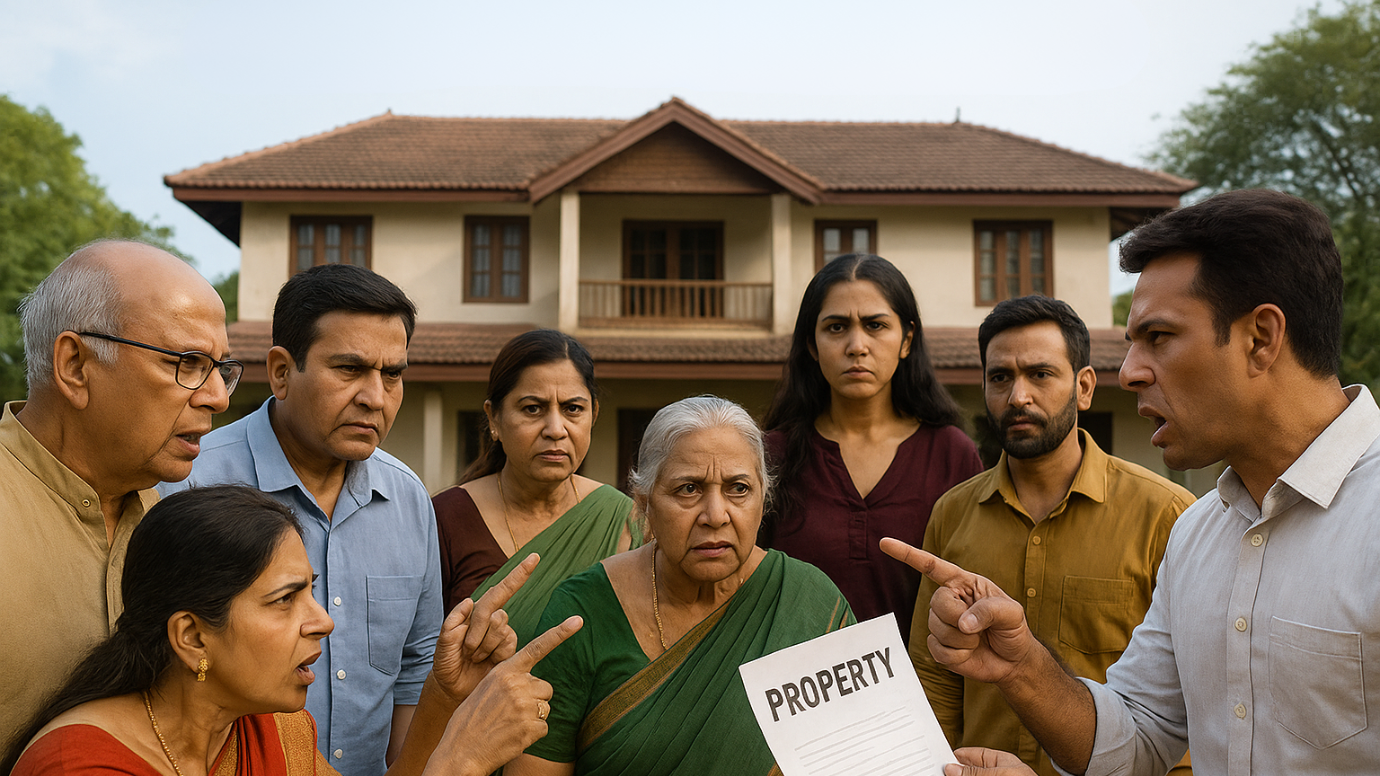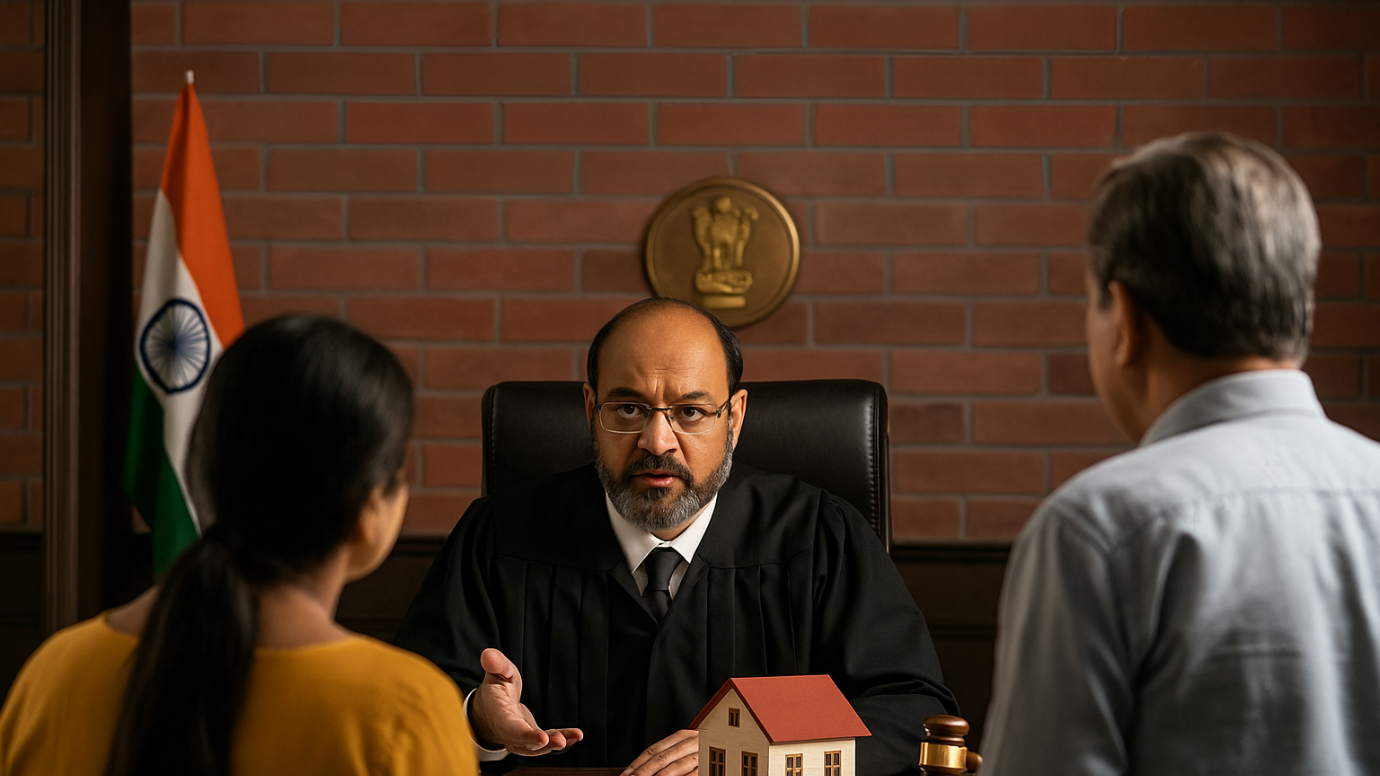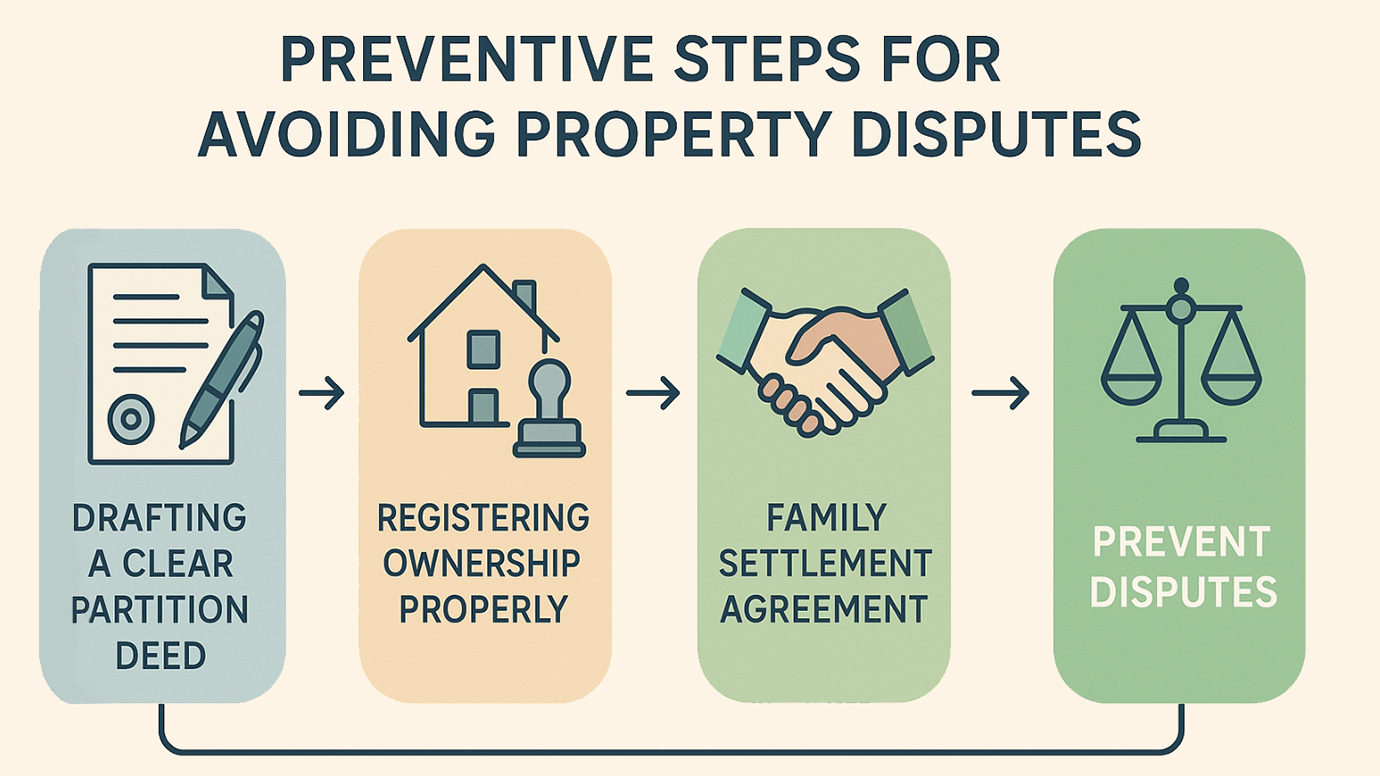Joint Property Ownership Disputes: Legal Solutions Explained

In India, joint ownership of property is a very common arrangement. Families often inherit ancestral houses together, siblings become joint tenants of agricultural land, or spouses and business partners invest in flats as co owners. At first, joint property ownership might seem convenient—everyone shares the asset, the responsibilities, and even the financial benefits. But when expectations clash or one co-owner tries to exercise control beyond their share, joint property ownership disputes often arise.
Many Indians find themselves asking crucial questions like: “Can a jointly owned property be sold by one owner without the consent of others?” or “How to divide jointly owned property among siblings or legal heirs?”. These issues are not just emotional—they can lead to long-drawn court battles if not handled with proper legal guidance.
The laws regarding joint ownership of property in India are designed to protect the rights of all co-owners, whether the property is inherited, purchased together, or acquired through marriage. However, without awareness of your rights—such as the right of survivorship in certain types of ownership, or the rules of property settlement—you may end up losing time, money, and even your rightful share.
This blog aims to break down the complexities of joint ownership, explain the rights of co-owners, and offer practical legal solutions for joint property disputes in India. Whether you are dealing with ancestral property, a jointly purchased flat, or a business investment gone wrong, knowing the correct remedies can help you resolve conflicts fairly and efficiently.
What is Joint Property Ownership?
In simple terms, joint property ownership means that two or more individuals hold legal rights over the same property. This form of co ownership of property is quite common in India, especially when siblings inherit ancestral homes, spouses buy a flat together, or even when NRIs retain investments in India alongside family members.
Under Indian property law, joint property ownership ensures that each co-owner has specific rights and responsibilities. They share possession, enjoy income from the property (such as rent), and also carry an obligation to respect the rights of other co-owners. However, when differences arise over usage, sale, or division, disputes often surface, making it important to understand the laws regarding joint ownership of property.
Types of Co-Ownership in India
1. Joint Tenancy
In this arrangement, all joint tenants hold equal rights to the property, regardless of their financial contributions. A key feature here is the right of survivorship—when one co-owner passes away, their share automatically transfers to the surviving co-owners. For instance, if two business partners jointly buy a commercial property, the surviving partner inherits the deceased partner’s share.
2. Tenancy in Common
Unlike joint tenancy, tenancy in common allows each co-owner to hold a specific share in the property, which may be equal or unequal depending on their contribution. There is no automatic right of survivorship here—the share of a deceased co-owner passes on to their legal heirs. This is often the case when siblings purchase land together, but each one wants to ensure their children inherit their share.
3. Coparcenary under Hindu Law
Unique to Hindu families, coparcenary arises in the context of joint property inherited from ancestors. Every coparcener (traditionally male descendants, though women have had equal rights since the 2005 amendment to the Hindu Succession Act) automatically acquires a birthright in the property. For example, four generations of a Hindu family may simultaneously hold rights over the same ancestral house.

Some Examples of Joint Ownership
- Two brothers inheriting their late father’s farmland under coparcenary rights.
- A husband and wife purchasing a flat together, making them joint tenants.
- NRIs keeping investments in India by holding joint property with siblings or parents.
Understanding these distinctions is crucial not only for smooth property management but also for effective property settlement if disagreements arise. By knowing the legal framework, co-owners can prevent avoidable disputes and protect their rightful share.
Common Causes of Joint Property Disputes
While joint ownership of property can seem convenient in the beginning, it often becomes complicated when multiple people try to manage the same asset. Over time, differences in expectations, financial priorities, or even personal relationships can lead to serious joint property ownership disputes. Let’s look at the most common reasons why such conflicts arise in India.

Unequal Contributions but Equal Ownership
One of the most frequent triggers for disputes is when co-owners invest unequal amounts but end up with equal rights over the property. For example, if two brothers buy a flat where one contributes 70% of the cost and the other only 30%, both still enjoy the same rights under joint ownership unless otherwise documented. This mismatch between financial input and legal entitlement often becomes a source of tension.
Disagreement on Sale, Lease, or Mortgage
Another recurring issue is the question: “Can a jointly owned property be sold by one owner without the consent of the others?” The short answer is no—under laws, one co-owner cannot unilaterally sell or mortgage the entire property. However, they can transfer their individual share. Disputes erupt when one co-owner wants to sell, lease, or mortgage the property, while others want to hold on to it.
Partition Issues in Ancestral Properties
Disputes are particularly common in cases involving ancestral homes or agricultural land. Here, multiple family members become joint tenants depending on their rights. Questions like “how to divide jointly owned property among heirs?” often arise, and disagreements on valuation, division, or usage lead to court battles.
Misuse of Property by One Co-Owner
When one co-owner uses the property exclusively—by renting it out and keeping the income, or occupying it without consent—others may feel deprived of their rights. Such misuse goes against the principle of equality in joint property ownership and often results in litigation for fair use or property settlement.
Family Disputes After Inheritance
Inheritance-related conflicts are perhaps the most sensitive. When property passes to multiple heirs, emotional factors mix with legal complexities. A lack of clarity about shares under joint property or the absence of a registered family settlement can fuel long-standing disputes. Even though the right of survivorship applies in some cases (like joint tenancy), in many Indian families, property ends up in tenancy in common, where each heir’s share passes to their successors, making division even more complex.
In short, joint property ownership disputes often arise from mismatched expectations, unclear documentation, and lack of awareness about the laws regarding it. By understanding these common causes, co-owners can take proactive steps—such as clear agreements, timely property settlement, and legal advice—to avoid unnecessary conflict.
Legal Rights of Co-Owners in India
When multiple individuals hold joint ownership of property, each co-owner is granted specific rights under Indian law. These rights are designed to ensure fairness and to prevent conflicts that often arise in cases of joint property ownership disputes. Whether the arrangement is between siblings, spouses, business partners, or heirs, the law recognizes and protects the following rights of co-owners.
1. Right to Possess and Enjoy the Property
Every co-owner has an equal right to possess and use the joint property, regardless of the size of their financial contribution. For example, if two brothers inherit land as joint tenants, both can live on or use the property equally. If one co-owner tries to exclude the other, it can be challenged legally under the laws regarding joint ownership of property.
2. Right to Share in Profits
When a property is rented out or earns income through lease or commercial use, each co-owner has the right to receive profits in proportion to their ownership share. In cases of tenancy in common, this division may not always be equal, but it must be fair according to the documented shares. Withholding rent or income by one co-owner is a common cause of joint property ownership disputes.
3. Right to Partition and Separate Ownership
Perhaps the most important right under co ownership of property is the right to seek partition. If co-owners cannot agree on how to use the property, any one of them may approach the court to initiate a partition suit. This legally divides the joint ownership into distinct shares. For example, in disputes involving ancestral homes, courts help decide how to divide jointly owned property so that each person gets a clear and enforceable share.
4. Right to Transfer or Gift Their Share
While one co-owner cannot sell the entire property alone, they do have the right to sell, transfer, or gift their individual share to another person. This often sparks the question: “Can a jointly owned property be sold by one owner?” The answer is yes, but only their portion can be transferred—not the whole property. This distinction is critical in preventing unfair transfers and maintaining balance among co-owners.
5. Duties of Co-Owners
Alongside rights, co-owners also carry certain duties. They must not encroach upon or diminish the rights of others. For instance, one co-owner cannot unilaterally alter the property, restrict access, or misuse rental income. Failure to respect these duties can result in court intervention and may even complicate eventual property settlement.
In essence, the rights attached to joint ownership of property—from enjoyment to partition—offer legal safeguards that protect every co-owner. Whether property is held as joint tenants with a right of survivorship, understanding these rights is the first step to preventing disputes and ensuring smoother management of shared assets.
Legal Remedies & Solutions for Joint Property Disputes

When multiple people share rights over the same property, disagreements are bound to occur. Fortunately, Indian law provides clear remedies for resolving joint property ownership disputes. Whether the property is inherited, purchased jointly, or held under tenancy in common, co-owners can rely on various legal solutions to safeguard their interests and achieve fair property settlement.
1. Partition of Property
The most common remedy in cases of joint property ownership is partition. Partition allows co-owners to divide the property so that each one has a defined share instead of continuing under joint ownership.
Partition through Court (Civil Procedure Code – CPC):
If co-owners cannot agree amicably, one may file a partition suit in India under the CPC. The court then examines ownership records, evaluates shares, and physically or legally divides the joint property.Partition Deed and Registration:
In cases where family members or joint tenants agree to divide property without litigation, they can draft a partition deed. Once registered, it has the same binding effect as a court order.Simplified Example:
If three siblings inherit ancestral land, each has equal rights under laws regarding joint ownership of property. By filing a partition suit or registering a deed, each sibling can secure their separate portion.
2. Mediation & Arbitration
Not all disputes require years in court. For families that prefer harmony, mediation and arbitration provide an alternative.
Mediation:
Encourages dialogue and compromise, especially useful in family property disputes.Arbitration:
Involves a neutral arbitrator whose decision can be binding.Benefits:
Both methods are faster, cost-effective, and help preserve family relationships compared to lengthy litigation.
For example, siblings disputing over how to divide jointly owned property can settle through mediation rather than endure years of court proceedings.
3. Sale of Property & Distribution of Proceeds
Sometimes dividing a property physically is not possible—for instance, a single flat or shop. In such cases, co-owners may agree to sell the property and split the proceeds.
When Co-Owners Agree:
The process is simple; the property is sold, and profits are shared as per ownership rights.When One Co-Owner Refuses:
Courts can intervene to order the sale and ensure fair distribution. This often arises when one party wants to hold on, while others want to liquidate their share.
This also answers the common query: “Can a jointly owned property be sold by one owner?” No one co-owner can sell the entire property, but they may sell their individual share. If disputes arise, courts can enforce equitable sale or division.
4. Injunction & Legal Protection
During disputes, one co-owner may try to misuse or sell property without consent. To prevent this, courts can grant an injunction.
Temporary Injunction:
Stops illegal sale, lease, or encroachment during litigation.Legal Protection:
Safeguards the rights of all parties until the matter is resolved.
This ensures that no co-owner loses their rights while the case is pending.
5. Special Case: Ancestral Property & Coparcenary Rights
Ancestral property disputes often involve complex legal issues under Hindu law.
Hindu Succession Act, 1956 (Amended 2005):
Recognizes the equal rights of women as coparceners, giving daughters the same rights as sons in ancestral property.Coparcenary Rights:
Every member acquires rights in the property by birth. Unlike joint tenants with a right of survivorship, in Hindu coparcenary, rights are distributed across generations.
For example, in a Hindu joint family, four generations may simultaneously hold rights, making property settlement and division particularly sensitive.
Indian law provides multiple remedies—from partition suits to mediation, injunctions, and legal recognition of women’s rights in ancestral property. By understanding the laws regarding joint ownership of property, co-owners can choose the most suitable path—whether amicable settlement or court intervention—to resolve conflicts and protect their rightful share.
How Courts in India Handle Joint Property Disputes

When conflicts arise in cases of joint ownership of property, many families and co-owners ultimately turn to the courts for resolution. Indian courts—both civil courts and family courts—play a central role in deciding matters of joint property ownership disputes, especially when amicable settlements are not possible. Understanding how the legal system works can help co-owners make informed decisions about their rights and remedies.
1. Role of Civil Courts and Family Courts
Civil Courts:
Most disputes involving co ownership of property, including division, possession and sale, are heard in civil courts. For instance, a partition suit is typically filed in a civil court when co-owners cannot agree on how to divide jointly owned property.Family Courts:
When disputes involve close relatives, such as inheritance or matrimonial property, family courts may step in to facilitate resolution. They often encourage settlement and mediation before formal litigation.
In both courts, judges examine property documents, ownership records, and the applicable laws regarding joint ownership of property to determine fair division or settlement.
2. Timeframe: Court Delays vs. Mediation
One of the biggest challenges in property cases is the timeline. Litigation involving joint property ownership can stretch for years due to heavy caseloads and procedural delays. A partition suit in India may take several years before a final decree is passed.
This is why mediation is often recommended as a faster alternative. Through mediation, co-owners can reach a property settlement in months rather than years, saving time, money, and relationships. However, when mediation fails or one party refuses to cooperate, court intervention becomes unavoidable.
3. Importance of Documentation and Legal Strategy
Success in property disputes largely depends on strong documentation and a clear legal strategy. Co-owners must provide valid proof of ownership, such as sale deeds, wills, or succession certificates. Without such documentation, courts may struggle to establish the shares of joint tenants or individuals under tenancy in common.
Moreover, legal strategy is crucial. For example:
- If one co-owner misuses the property, an injunction can be sought.
- If disputes arise about sale, courts examine whether a jointly owned property can be sold by one owner and ensure no party’s rights are unfairly compromised.
- In cases involving ancestral property, courts also consider special provisions like the right of survivorship or equal rights of daughters under the Hindu Succession Act (2005 amendment).
To sum up, Indian courts handle joint property ownership disputes with careful scrutiny of documents, legal provisions, and family dynamics. While the process may be time-consuming, it ensures that every co-owner’s rights are protected and that joint property is fairly divided or settled. For those seeking quicker resolutions, mediation and negotiated property settlement remain effective alternatives—but having strong legal representation in court is often the key to protecting your share.
Preventive Measures to Avoid Future Disputes

Disputes over joint ownership of property can be emotionally draining and financially exhausting. While courts provide remedies such as a partition suit, it is always wiser to prevent conflicts from arising in the first place. With proper planning, documentation, and timely legal advice, families and co-owners can avoid years of litigation and maintain healthy relationships. Here are some key preventive measures to ensure smoother joint property ownership.
1. Drafting a Clear Partition Deed
A partition deed is one of the most effective ways to reduce the risk of joint property ownership disputes. By clearly mentioning each co-owner’s share, rights, and obligations, it eliminates ambiguity. For example, siblings who inherit property can execute a deed that specifies how to divide jointly owned property fairly among themselves. Once registered, the deed has binding legal effect and prevents future disagreements.
2. Registering Ownership Properly
Unclear documentation is one of the biggest causes of disputes. Properly registering the ownership rights of joint tenants ensures that everyone’s share is legally recognized. Without registration, one may later question whether a jointly owned property can be sold by one owner, leading to unnecessary litigation. Registered documents also help courts or mediators verify ownership more efficiently if conflicts arise.
3. Family Settlement Agreements
In many Indian families, disputes over joint property are avoided through family settlement agreements. These agreements are informal but legally valid if drafted carefully. They allow family members to agree on usage, division, or even future sale of the property without filing a partition suit in India. Such settlements not only save time and money but also preserve family harmony.
4. Taking Legal Advice Early
One of the best preventive measures is seeking legal guidance before problems escalate. Experienced lawyers can explain the laws regarding joint ownership of property, draft agreements, and suggest fair terms for property settlement. They can also guide families on whether the property is governed by the principle of right of survivorship (as in joint tenancy) or if it falls under co ownership of property in the form of tenancy in common. Early advice ensures that small misunderstandings don’t grow into full-fledged joint property ownership disputes.
Prevention is always better than cure when it comes to joint ownership. Whether it’s drafting a clear partition deed, registering property correctly, or creating a family settlement, these steps help avoid unnecessary conflict. With proactive legal support, co-owners can enjoy the benefits of shared ownership while steering clear of long-drawn disputes and court battles.
FAQs
A. Joint ownership of property means that two or more people legally share ownership rights over the same asset, giving them equal authority to use and enjoy it.
A. In joint property ownership, all co-owners must usually consent to major decisions like selling, leasing, or mortgaging, which ensures no one is unfairly excluded.
A. Under tenancy in common, each co-owner has a specific share in the property, which can be passed on to their heirs, unlike joint tenancy where shares go to surviving owners.
A. No, a jointly owned property cannot be sold by one owner. One person can only sell their share, not the entire property.
A. The right of survivorship means that if one co-owner dies, their share automatically transfers to the surviving co-owners, leaving nothing to inheritance claims.
A. A property settlement can be achieved by creating a family settlement agreement, drafting a partition deed, or approaching the court for a fair division of property.
A.Most joint property ownership disputes arise from unequal contributions, disagreements over sale or lease, misuse by one co-owner, or unclear succession rights.
Conclusion
Disputes arising from joint ownership of property are among the most complex legal battles in India. They involve not only questions of law but also deep emotional and family ties. Whether the issue is over ancestral land, a jointly purchased flat, or commercial co ownership of property, timely legal action is critical to avoid prolonged stress and financial loss.
Trying to manage joint property ownership disputes without professional guidance can be risky. Many people end up filing the wrong petitions, missing important deadlines, or misinterpreting the laws regarding joint ownership of property. The result is often unnecessary delays, mounting expenses, and even the loss of rightful shares. For example, if one does not understand whether their property is held under tenancy in common, they may fail to protect their inheritance or ownership rights.
It is also important to remember that while one co-owner may ask, “Can a jointly owned property be sold by one owner?”—the law is clear that no single person can sell the entire property without consent. Missteps like these can quickly escalate into legal battles that require filing a partition suit to decide how to divide jointly owned property fairly.
That said, litigation is not always the only answer. Peaceful solutions such as family settlements, mediation, or mutually agreed property settlement are often faster and less stressful. However, even in these cases, the presence of an experienced lawyer ensures that agreements are drafted properly and recognized by law, preventing future conflicts.
Ultimately, disputes over joint property are best handled with a balance of empathy and legal expertise. While peaceful resolution should always be the first step, professional legal support is essential to safeguard your rights and ensure that the outcome is fair. If you or your family are facing issues of joint ownership, the safest approach is to consult a trusted property lawyer early—before disagreements turn into years of courtroom battles.
For more insights into related legal topics or to understand how professional legal support works, you may also explore our Homepage for general information.
Disclaimer:
This blog is intended for educational and informational purposes only. It should not be taken as legal advice or relied upon as such. Cases of Property Disputes are highly sensitive and often vary based on individual circumstances, which may affect the legal remedies available.
If you or someone you know is facing such challenges, it is advisable to seek guidance from a qualified lawyer or legal professional. For safe and confidential support, you may also consider reaching out to trusted legal platforms such as Adlegal.



